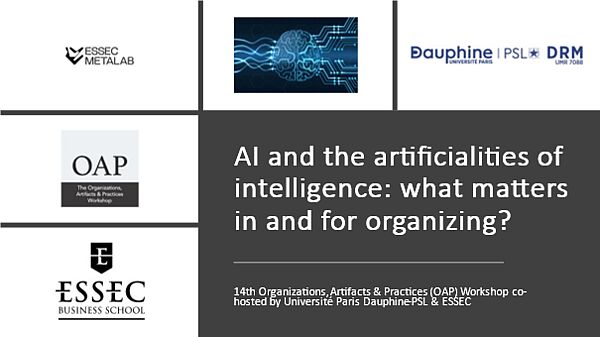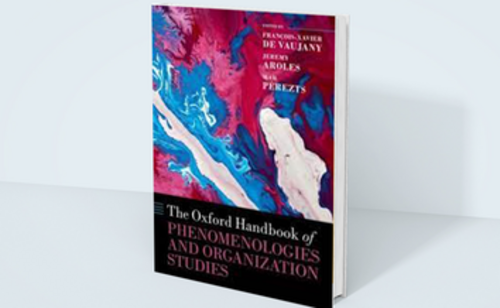Workshop OAP | AI and the artificialities of intelligence

AI & the artificialities of intelligence: what matters in and for organizing?
The 14th Organizations, Artifacts & Practices (OAP) workshop will take place on the 6th and 7th of June, 2024, at ESSEC and Université Paris Dauphine - PSL (onsite only).
OAP 2024 will be co-chaired by Ella Hafermalz, (VU), Julien Malaurent (ESSEC), Aurélie Leclrecq-Vandelannoitte (CNRS & IESEG), Youngjin Yoo (Case Western University), Will Venters (LSE) and François-Xavier de Vaujany (Université Paris Dauphine - PSL, DRM).
The topic will be an opportunity to come back to the issue of Artificial Intelligence and its relationship with the history, philosophy and politics of management and organization.
This 14th OAP workshop will be hosted both by ESSEC (ESSEC Metalab) and Université Paris Dauphine - PSL (DRM).
The is open to all academics interested in the topic of Science and Technology Studies related to work, organization and organizing (e.g. materiality, technology, performativity, visuality, process, space, time, etc). Management and organization studies scholars, philosophers, sociologists, anthropologists, among others, are invited to participate to our debates.
Program
- June 6 (09h-19h) at ESSEC Business School : Dauphine Philosophy Workshop (pre-event of OAP 2024)
- June 7 (08h30-18h) at Université Paris Dauphine- PSL: 14th OAP workshop
“Artificial Intelligence now pervades discussions about the future of organizations and societies. AI is expected to bring deep changes in work practices and our ways of living. Utopian and dystopian narratives are abundant. However, AI is far from being a fleeting trend; rather, it constitutes a collection of techniques with a rich history dating back to the 1950s. AI serves as a broad framework deeply intertwined with ideals of rationalism and representationalism – much like the broader digital landscape it epitomizes. The aspiration in the realm of AI is that self-sufficient techniques will progressively and continuously enhance our comprehension of the world. By means of rules and the use of massive amounts of data, it is expected that learning capabilities make AI tools more and more likely to expose and elucidate the underlying realities of the processes they initially are designed to represent. Increasingly, AI transcends its role as a ‘unraveller’ of complexity in the present. It discloses our future, what will happen in the next seconds, days, month, years or centuries. It arguably encompasses the entirety of our potential futures.
As well as having a certain hold on our future(s), these powerful tools are impacting how we think. Our cognition and understanding of the world are dramatically extended, amplified, revolutionized, but also individualized, siloed, and cut off from traditional social processes of interaction and sensemaking. In this vein, the gap between our ways of acting (in an embodied way) and our ways of thinking, grows. The dualism at the heart of representationalism, although more and more visual, narrative and corporeal, become central and even foundational. Part of our cognition – and our social practice of gaining and sharing knowledge - is delegated to AI.
These artificialities of intelligence (in particular collective intelligence), will be at the heart of this 14th OAP workshop in Paris. Behind and beyond AI as a set of codes, norms, standards, and massive use of data, our intelligence is more and more artificialized. Our collective intelligence relies on a representationalist philosophy which starts from a problem (a request) submitted to Bard or Chat GPT, generative AI tools, offering then a relevant narrative likely to answer brilliantly and confidently. Coproblematization, inquiry, concerns, openness, in short, life, are not at all part of this equation. This artificial organizing process will be central in our discussions.”
About the OAP Workshop
The Organizations, Artifacts & Practices (OAP) workshop has been founded in 2011 by François-Xavier de Vaujany and Nathalie Mitev. Its first running gathered researchers of Université Paris Dauphine-PSL and the London School of Economics (LSE) interested in Science and Technology Studies (STS) in the context of organizations and organizing.
OAP is focused now on ontological and metaphysical discussions about organizations and organizing in a digital era. Each year, OAP is hosted by different universities, in different countries (France, UK, Singapore, Italy, Brazil, Netherlands, US, etc.).
It is free, open to all, and collectively co-documented by participants.
- 7th Dauphine Phenomenology Worshop | DPW 2023

202320Apr202321Apr
- "Le prix en droit des contrats : droit français et droit comparé"

202426Sep